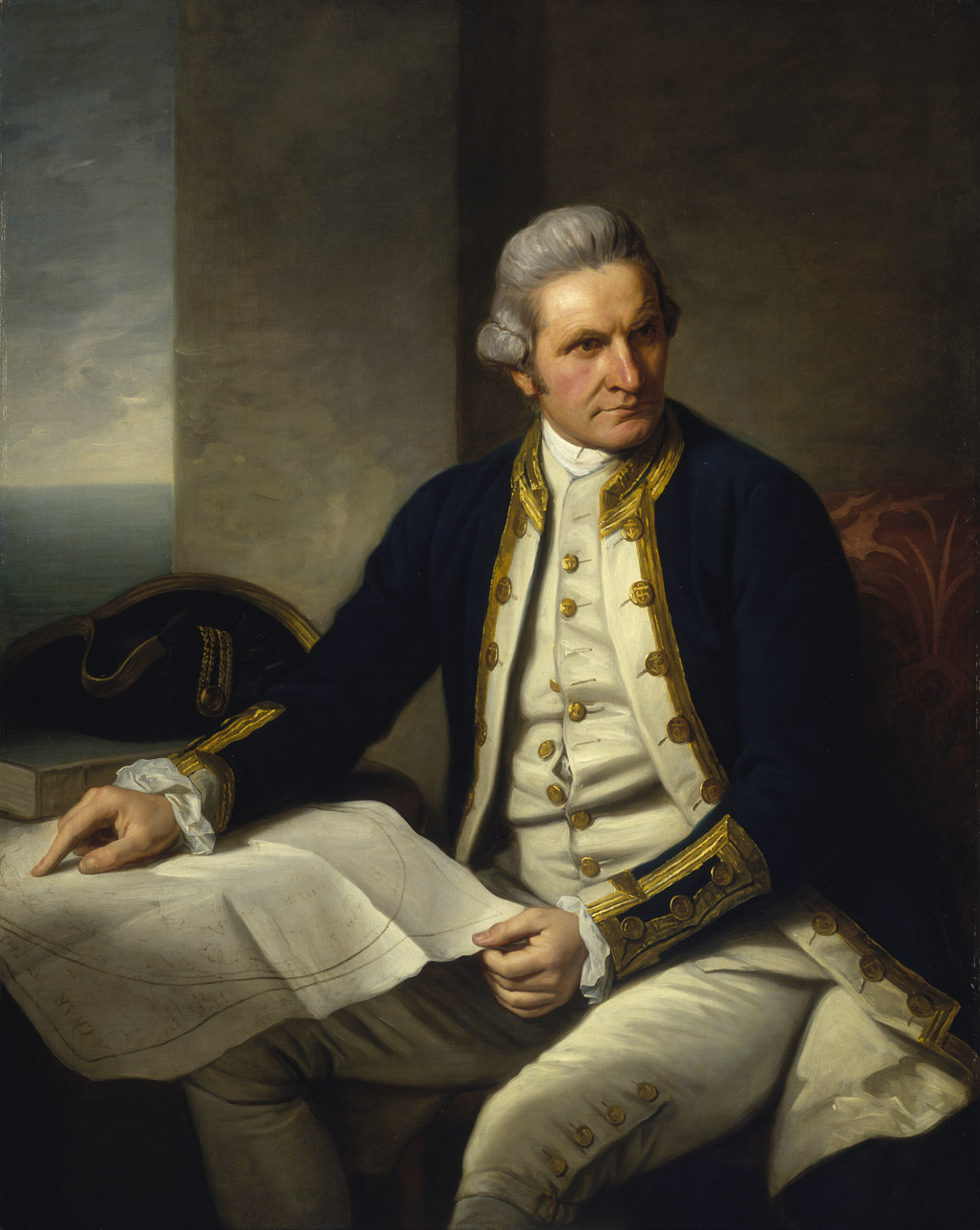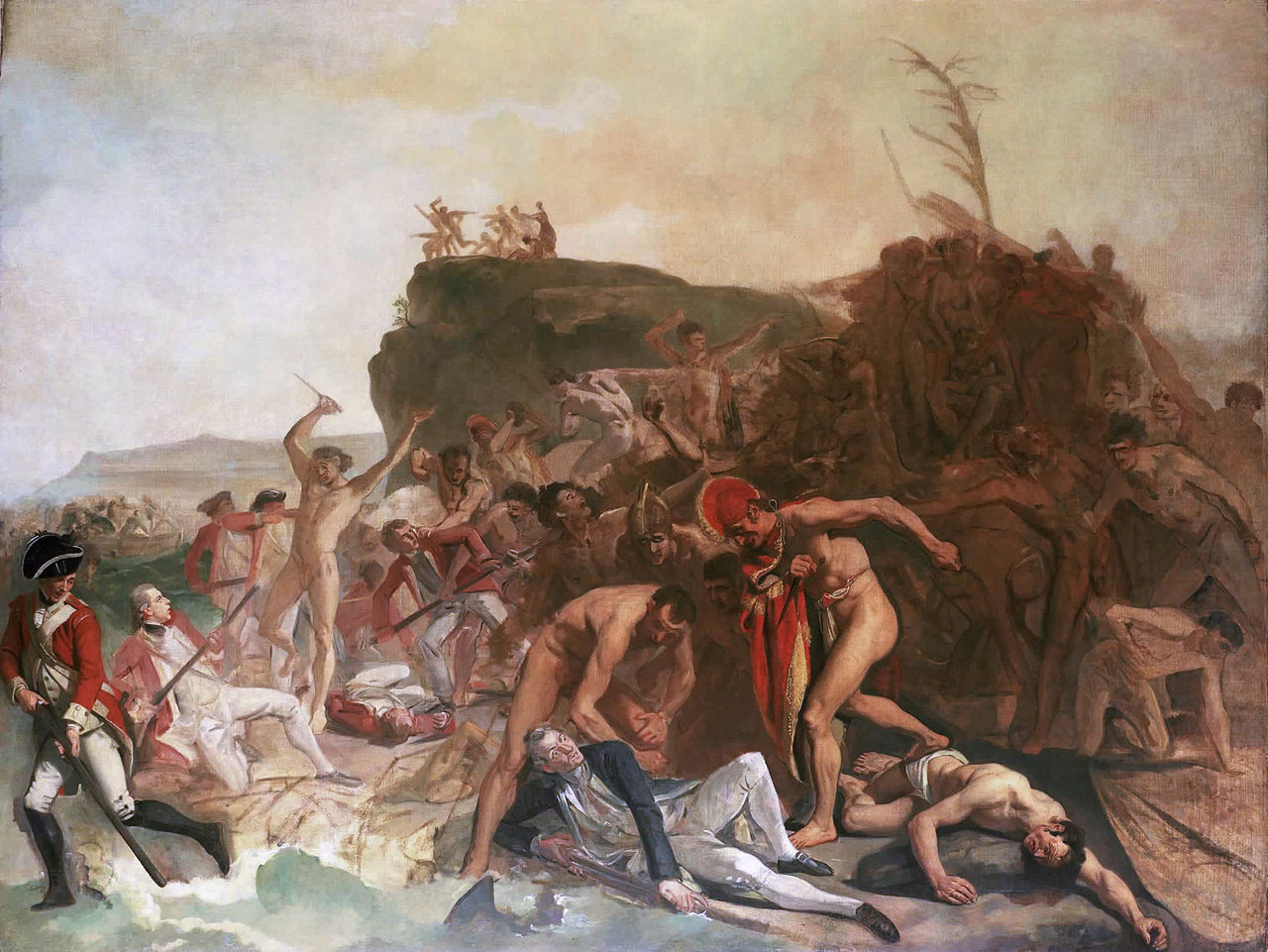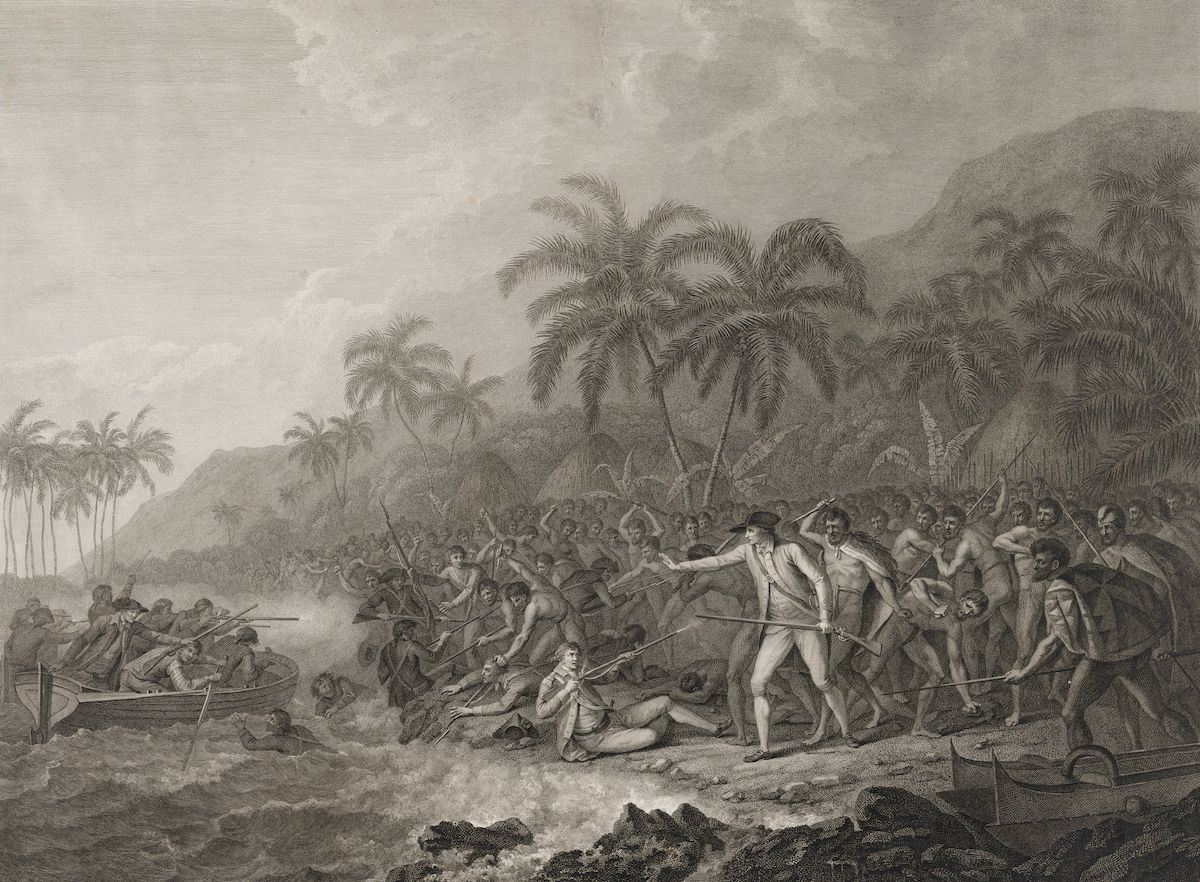In the XNUMXs, the ritual murder of Captain James Cook by the native Hawaiians was at the center of a "postmodernist" controversy between a Sri Lankan sociologist, Gananath Obeyesekere, and the emeritus US professor Marshall Sahlins, a famous anthropologist of the Pacific and Stone Age.
di Stephen Malatesta
published the Republic, March 16, 1997
The white man who is taken for a god by the natives (will it be more correct to put the term in the strict surveillance of the quotation marks?) is a constant of adventure books and films and of anthropology and history of discoveries texts. In the'Man who wanted to be king, the story of Kipling, a likeable, megalomaniac Victorian rascal is welcomed as a deity, reincarnation of Alexander the Great, by the Hindukush Kaffirians and thinks he will become rich until everything falls apart. Pacific stories tell us that the great Captain Cook, when he arrived in Hawaii with the "Resolution" and "Discovery", on his third and final voyage, was celebrated as the god Lono. Not to mention Hérnan Cortés, who Montezuma believed he was an Aztec god sent to chastise him and close a cycle, according to what the poets themselves tell Nahuatl.
But are these interpretations of savage thinking credible? Or are they not myths, which have always been inflicted on indigenous peoples and embroidered by Western scholars, which mask their inherent imperialism and sense of superiority behind theories that are only apparently scientific and objective? And the Hawaiians (the Cafiri, the Mexicans), were they so unintelligent, so lacking in common and practical sense and rationality, that they let themselves be duped? Not to understand that those smelly and carnally hungry sailors of women, so different from them, were not divine in nature?
Around these non-secondary questions, a furious controversy has opened up for some years which, starting from Lono, from the beliefs of the Hawaiians, and from how Cook was killed and why, ended up questioning the whole relationship between anthropology and natives and anthropology itself as a science. The two protagonists of the clash are a Sri Lankan sociologist, Gananath Obeyesekere, who as a "native", feeling solidarity with all the natives and believing that he has a privileged vision of Hawaiian thought (presumably, what unites Sinhalese and Hawaiians derives instead from the cultural influences of the West), in 1992 wrote a book, The Apotheosis of Captain Cook, attacking the claim of Westerners, seen as agents of imperialism, to interpret a story that is not theirs. And the emeritus professor Marshall Sahlins, American, famous Pacific and Stone Age anthropologist.

Called in the first person to answer for various wrongdoings, Sahlins responded with an essay released in recent days for Donzelli: Captain Cook, for example (pp. 287, 38.000 lire). The real terms of the controversy are not well understood except by referring to a postmodernist wave, let's call it that, which has invested anthropology in the last ten years. As Francesca Giusti explains in the presentation of the book, this new critical vision, then quite diversified, is based roughly on the belief that the history of anthropology cannot be studied separately from the history of colonialism (the suitable interpretative category would be conflict, because essentially deals with events of iron and fire). And that all the autobiographical and subjective components must be recovered, canceled by a claim of objectivity of the so-called scientific knowledge.
Now there has always been anthropological research in the service of imperialism. The first, sensitive observers of primitive cultures almost all belonged to colonial countries: many had in mind, as an ultimate goal, the conversion of the natives to a religion considered superior and were often paid for by governments because a thorough knowledge of the subject populations meant greater control. safe. But all of this did not mean that their works were not valid by definition.
Years ago I happened to be among the Bassari, a population living inside Senegal, accompanied by a strange character, an Italian former poacher, who became a painter in Dakar, who spoke their language. In the village we met a French anthropologist from the Musée de l'Homme in Paris who had been hitting those parts for thirty years and who was still called "the etrangère". The Italian, in perfect confidence with the Bassari men and especially with the women, told me laughing that the locals were annoyed by all those questions that the anthropologist asked and that to get rid of it they invented the moment of stories. They had an extraordinary flair for adapting their stories to the expectations of the Frenchwoman.
But I also met numerous other anthropologists who had done a splendid job: everything depended on their interpretative skills, their patience, and the love that was seen shining through the subjects studied. The objections of postmodern anthropology are serious, but certainly not new: it can be said that they have always accompanied, underground or on the surface, field research.

In the present case, this important case was defended by an inept lawyer, who went to choose a field on which he did not have sufficient competence. Sahlins' book is at the same time a devastating answer, a beautiful essay on anthropology, all too technical (for the fury of destroying his opponent even in the smallest details). And a vindication of the natives' legitimacy to interpret phenomena as a relationship between cosmology and history, in a generically mythical sense, and of the ability of Western scholars to understand cultures that are also very different from their own. Bourgeois realism based on common sense, if taken as a historiographical concept valid everywhere, is a violence that is done against other eras and other customs.
The end of 1778 in Hawaii coincided with the festival of Makahiki, the annual rebirth of nature, represented as a primordial cosmic drama, which at one point predicted the arrival of Lono, an exiled god. as a deposed king. When Cook's ships appeared in Kealakekua Bay, the Hawaiians gave him the most impressive and festive welcome ever given to a European navigator, as all historians agree. "We anchored on black sand bottoms, among an endless number of canoes whose occupants sang and expressed their joy," says the logbook.
The beach was overwhelmed with crowds, the canoes were loaded with pigs, breadfruits and all the products of the island. Once aboard, people continued singing, dancing, screaming, clapping and constantly getting on and off the ships and the women, as the ship's doctor later reported, seemed particularly anxious to join the sailors. Such an epiphanic dimension could only be explained with the arrival of a god.

Cook left on February 3, when the Makahiki had just finished. Unfortunately a storm knocked down the "Resolution" foremast and the British were forced to return to Kealakekua Bay for repairs. This time there were a few hundred people to welcome them, looking perplexed and not very festive. The thefts began, more and more numerous and the leaders were very insistent in asking the reason for their return and the story of the breaking of the foremast did not convince them. Obeyesekere interpreted the changed attitude, which will lead to the killing of Cook, with the brutality of the sailors, with the infringement of a taboo consisting of a sacred palisade that the British would have burned. And with the impatience, which had become hostility, for Cook's constant requests for food, which had caused the Hawaiians to run out of supplies (but in reality the most extensive and productive agricultural system in the Pacific operated on the island).
However, the problem was neither empirical nor practical, as Sahlins explains very well: it was cosmological. The Polynesians had a strange relationship of submission and opposition with the divine. Lono was invited into the human sphere to grant life and was then banished, so that humanity could take possession of the divine benefits.. A return of him immediately after leaving was sinister, because it could mean that he wanted to take back the power that he had ceded to the king.
Cook's decision to capture King Kalani'opu'u to obtain the return of a stolen spear was catastrophic and interpreted in this sense, producing a metamorphosis in the image of the captain: from being worthy of veneration to an enemy. The Hawaiians were forced to kill him. But 48 hours after his death, two priests attached to the cult of Lono reached the "Resolution" at night and weeping offered to the English a piece of meat, the upper part of Cook's thigh.
Sahlins' essay, through endless well-argued evidence, leaves no doubt that this is the correct interpretation of the killing of the greatest explorer in the Pacific (moreover, the Hawaiians were not the only ones to see the Europeans of "first contact" as supernatural beings. ). It is paradoxical that Obeyesekere, in his alleged defense of the natives, overturns the usual prejudices, attributing to them all the rationality that Westerners consider the highest form of thought, while endowing Europeans, anthropologists included, with an irrational attitude., which aims to revive the despised myth, as it is of a native genre. Not realizing that it is reproposing imperialist hegemony disguised as the resistance of the subordinate peoples, denying the Hawaiians their vision of things.

2 comments on “Dying like a god: the strange case of Captain Cook"